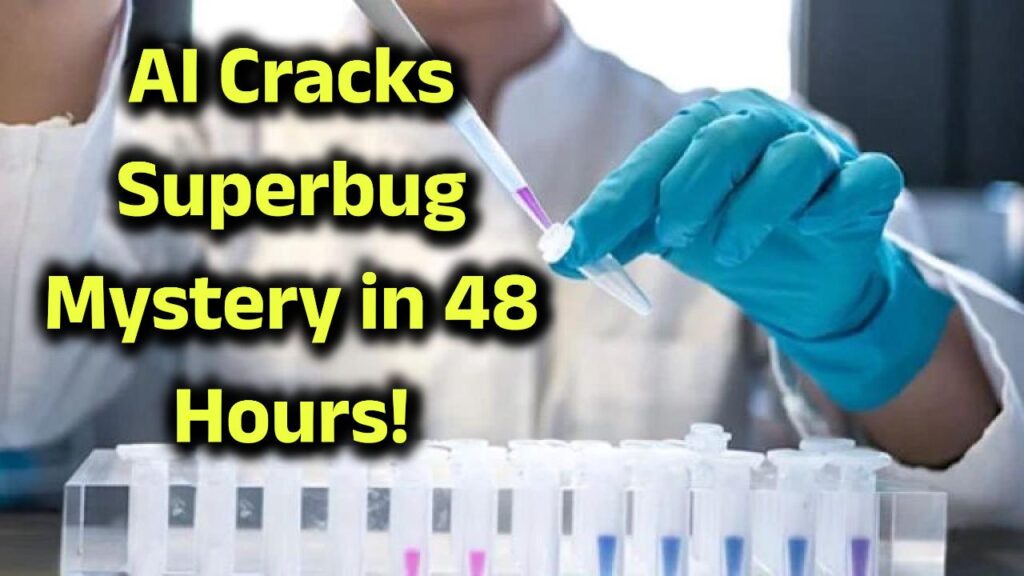
Antibiotic resistance is one of the biggest global health threats today, causing millions of deaths every year. However, a groundbreaking achievement has just been made: Artificial Intelligence (AI) solved a decade-long superbug mystery in just 48 hours! Scientists and medical experts worldwide are calling this a game-changer in the fight against antibiotic resistance.
This article explores how Google’s AI tool “co-scientist” cracked the code of superbug evolution, what it means for the future of medicine, and how AI is set to revolutionize disease research. Whether you are a curious reader, a healthcare professional, or a researcher, this guide will provide insights, expert opinions, and practical implications of this major discovery.
AI and Antibiotic Resistance
| Feature | Details |
|---|---|
| Breakthrough | AI solved a 10-year-old mystery of how antibiotic resistance spreads in just 48 hours. |
| Technology Used | Google’s AI “co-scientist” analyzed bacterial behavior and genetic mutations. |
| Major Discovery | Superbugs use viral “tails” to transfer resistance genes between species. |
| Speed Comparison | Traditional research took a decade; AI achieved the same in two days. |
| Future Potential | Faster antibiotic development, improved pandemic response, and better AI-driven medical research. |
| Ethical Considerations | Need for human oversight and proper AI regulations in medical research. |
| Official Reference | Imperial College London Study |
AI’s ability to solve a 10-year-old superbug mystery in just 48 hours is a historic achievement. This breakthrough could accelerate drug discovery, improve disease prevention, and transform medicine forever. As AI continues to evolve, its role in healthcare, research, and public health will only grow stronger.
For healthcare professionals and researchers, now is the time to embrace AI tools to speed up discoveries and improve patient care. The future of medicine is here—and it’s powered by artificial intelligence.
Understanding the Superbug Crisis
What are superbugs?
Superbugs are bacteria that have become resistant to antibiotics, making infections harder—or even impossible—to treat. Common superbugs include MRSA (Methicillin-resistant Staphylococcus aureus) and drug-resistant tuberculosis.
Why is antibiotic resistance dangerous?
- Increased deaths: Antibiotic resistance causes over 1.27 million deaths annually (WHO).
- Longer hospital stays: Drug-resistant infections lead to extended hospital treatments.
- Higher healthcare costs: Treating superbugs costs billions globally.
- Risk of untreatable infections: Some infections become resistant to all known antibiotics, leaving no effective treatment options.
Scientists have been puzzled for decades about how superbugs spread so efficiently between different bacterial species. Enter AI.
How AI Solved the Superbug Mystery in Just 48 Hours
AI has now changed the game in disease research. Researchers at Imperial College London spent ten years investigating how certain bacteria develop resistance. The leading theory suggested that bacteria borrow “tails” from viruses to transfer resistance genes.
The AI Breakthrough
- Step 1: Scientists input their research data into Google’s AI tool co-scientist.
- Step 2: The AI processed complex bacterial behaviors at record speed.
- Step 3: Within 48 hours, the AI confirmed the hypothesis and even suggested four additional possible explanations.
- Step 4: Researchers are now exploring one new AI-generated theory that could unlock even more medical advancements!
Why This is a Game-Changer
- Massive time savings: What took humans a decade, AI solved in just two days.
- New research paths: AI identified additional theories for bacterial resistance.
- Faster drug development: AI speeds up discovering new antibiotics and treatments.
Ethical and Regulatory Challenges of AI in Medicine
While AI presents tremendous potential, there are also ethical concerns and regulatory challenges:
- Bias in AI models: AI relies on data, which may contain biases leading to inaccurate results.
- Human oversight is crucial: AI should assist, not replace, human researchers.
- Regulation and safety: Governments must ensure proper testing and validation of AI-driven research before applying it in real-world treatments.
- Data privacy concerns: AI in healthcare must comply with HIPAA and GDPR regulations to protect patient information.
The Future of AI in Medicine
1. AI for Faster Drug Discovery
- AI analyzes thousands of potential drug compounds in hours instead of years.
- Example: DeepMind’s AlphaFold predicts protein structures to develop new antibiotics.
2. AI in Personalized Medicine
- AI tailors treatments based on individual genetic makeup.
- Example: IBM Watson analyzes patient data to recommend custom treatment plans.
3. AI in Disease Prediction and Prevention
- AI models predict pandemics and outbreaks before they happen.
- Example: AI flagged COVID-19 as a potential pandemic weeks before WHO.
How Can Healthcare Professionals & Researchers Use AI?
For Researchers:
- Use AI tools like Google’s co-scientist to test hypotheses faster.
- Apply AI-powered simulations for genetic research.
- Collaborate with AI companies to speed up discoveries.
For Doctors & Healthcare Workers:
- AI-driven decision support systems improve diagnosis accuracy.
- AI-powered electronic health records (EHRs) streamline patient care.
- Machine learning predicts treatment effectiveness for individual patients.
FAQs on AI and Antibiotic Resistance
1. Can AI replace human scientists?
No, AI is a tool to enhance human research, not replace it. Scientists still interpret and validate AI findings.
2. How reliable is AI in medical research?
AI is highly accurate but must be used with expert supervision to prevent errors.
3. Will AI help find new antibiotics?
Yes! AI is already helping discover new antibiotic compounds much faster than before.
4. Is AI being used to fight other diseases?
Yes! AI is used in cancer research, genetic disorders, and pandemic predictions.
5. What are the risks of using AI in healthcare?
- Data privacy concerns
- Bias in AI algorithms
- Need for regulatory oversight







